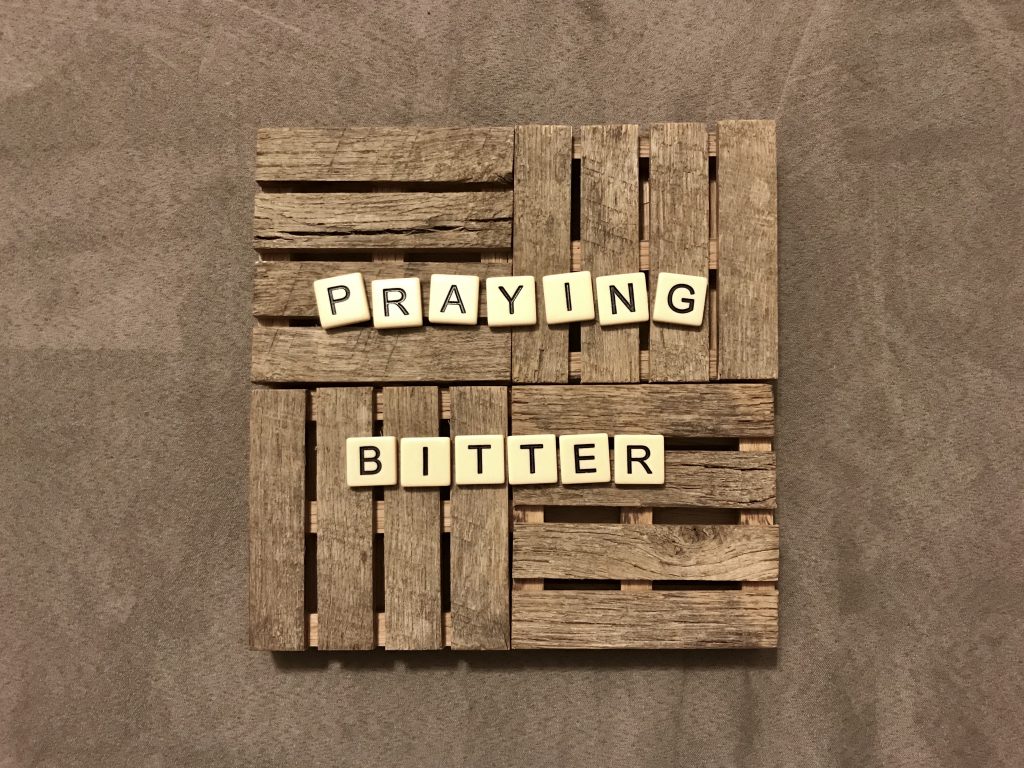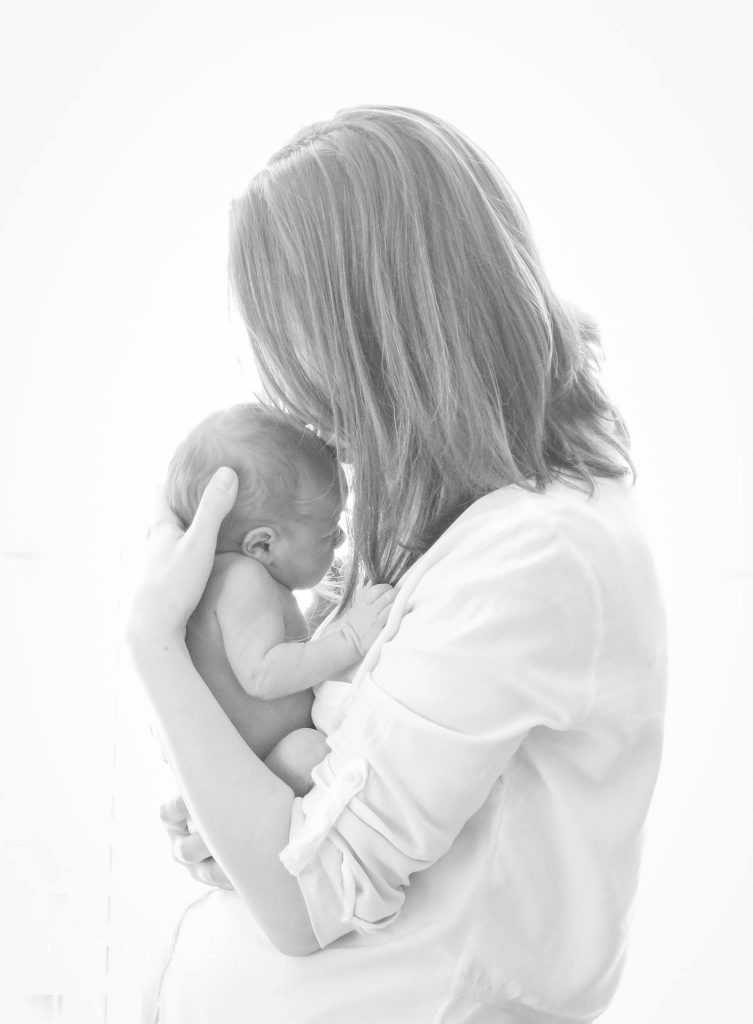My husband walked in to find me sitting in the bathroom holding my knees as tightly as I could trying not to let the wracking sobs escape. I was broken mentally because I was broken physically. Others all around me had become pregnant and delivered children but here I sat with what seemed like the 100th ovulation strip. It was almost blank – a faint line no darker than any before it. I didn’t have to show him the strip or explain the tears.
We were nearly 2 years into this journey. It was the last round of Clomid that my doctor would give before washing her hands of me for a specialist to handle. It felt so final. I knew in my head that many women spend much longer than two years trying to conceive a child, but my head rarely speaks the same language as my heart. Right then, my heart wanted no logic and it found no comfort.
Bitterness stood at the door of my soul waiting for the cracks to turn into holes so it could seep in. I held the babies of friends willing myself not to be jealous of the precious gift God gave them.
Bitter when we’re together.
The desire to bring children into a loving marriage is a good thing, right? It was not a sinful desire. But if it was good, why would God withhold it from me? And where was He is my pain?
The second time grief is mentioned in scripture is in 1 Samuel 1:16. (Side Note: The first time grief is mentioned it is a mother’s grief because of her son’s marriage to ungodly women. (Genesis 26: 34-35)) Now to be sure, this is not the first grief. I’m sure that with Cain murdered Abel, Eve experienced profound grief; however, we don’t get a glimpse into that grief. The second mention of grief really gives us a picture.

1 Samuel 1 introduces us to Elkanah and his two wives: Hannah and Peninnah. Hannah is childless. We don’t learn much about Peninnah other than she has children and provokes Hannah and made her miserable on a regular and continual basis. The later is not a great thing for which to be known. Many assume that Elkanah took a second wife to give him children after Hannah was unable. Hannah’s husband loves her even though she is childless. Elkanah regularly went to the temple and brought with him his family. Hannah both had to be with Peninnah and her children and did not have space from Peninnah’s provocation.
Tears More Than Words.
It is during one of these times that Hannah becomes so upset that she is weeping and cannot eat. She goes to the temple “in bitterness soul, and prayed to the LORD and wept in anguish.” (1 Samuel 1:10 NKJV). Have you been there, friend? Have you cried out with tears more than words? Hannah cried out to God with such emotion that the watching priest thought she was drunk:
And it happened, as she continued praying before the Lord, that Eli watched her mouth. Now Hannah spoke in her heart; only her lips moved, but her voice was not heard. Therefore Eli thought she was drunk. So Eli said to her, “How long will you be drunk? Put your wine away from you!”
1 Samuel 1:12-18
But Hannah answered and said, “No, my lord, I am a woman of sorrowful spirit. I have drunk neither wine nor intoxicating drink, but have poured out my soul before the Lord. Do not consider your maidservant a wicked woman, for out of the abundance of my complaint and grief I have spoken until now.”
Then Eli answered and said, “Go in peace, and the God of Israel grant your petition which you have asked of Him.”
And she said, “Let your maidservant find favor in your sight.” So the woman went her way and ate, and her face was no longer sad.
If you are anything like me, you don’t just picture Hannah when you read this — you picture yourself. Emotionally depleted. Overwhelmed to the core. No words remain, but you cry out to the God who created you. I can still feel it in my soul as I write this. The long-ago hurt and the current struggles crash together to form tears that threaten to cloud my vision and spill onto the pages of my Bible as I type.

Why Pray?
Hannah’s prayer here is not merely a repetition of her desire and request for a child. God is not a vending machine. You don’t put in the right combination of words to get what you want. With the absence of spoken word, it is clear that Hannah was praying with God as her hearer, not man.
Hannah is praying, not only to request the desires of her heart but to express the desires of her heart. There are many kinds of prayers. In teaching our children or collecting requests at church we tend to only think of prayer as a list of requests. We can see prayer more accurately as a conversation. If the only words you spoke to your spouse was your grocery list, the intimacy of your marriage would quickly fade.
Speak not just to share your requests but your heart. God cares about your heart; remember, he created it. You can tell him your hopes and fears. He waits patiently for you to confess your sins and struggles. He knows them before you speak, but as you speak, you know him better.
How God Sees Our Grief
We know God heals broken hearts, but where is God when our hearts aren’t ready to heal yet?
Our grief is never too much for God. The priest first makes wrong assumptions and then realizes his mistake. Once he does, his reaction is telling. He doesn’t tell Hannah to bottle her pain and keep it private. He doesn’t tell her to act with more dignity (remember he thought she had been drinking at first!) Take a look at the beginning of this Psalm from Asaph, one of the temple musicians:
I cry aloud to God,
Psalm 77:1-3 ESV
aloud to God, and he will hear me.
In the day of my trouble I seek the Lord;
in the night my hand is stretched out without wearying;
my soul refuses to be comforted.
When I remember God, I moan;
when I meditate, my spirit faints. Selah
Asaph expresses grief that isn’t ready for healing: “my soul refuses to be comforted.” It’s okay to not be okay. I am NOT encouraging you to wallow in grief eternally. It is okay to know that joy comes in the morning and also know that it is not morning yet. No where in the Christian handbook does it say to plaster a fake smile on your face when your heart is breaking. Yes, Jesus gives us life, and hope, and joy — but life involves loss and pain. Hope is meaningless if, literally, EVERYTHING is already perfect.
When Isaiah tells of the coming Messiah, he points out that “He is despised and rejected of men; a man of sorrows, and acquainted with grief: and we hid as it were our faces from him; he was despised, and we esteemed him not.” (Isaiah 53:3)
Raining Righteousness
This week, I came across a verse that reminded me of my beautiful, joyful sister-in-law:
Sow for yourselves righteousness;
Hosea 10:12
Reap in mercy;
Break up your fallow ground,
For it is time to seek the Lord,
Till He comes and rains righteousness on you.
While my journey through infertility was hard, hers was longer and much harder. Yet I watched her face the hardest of times with joy and hope. She walked with perseverance. Fallow ground is hard soil that isn’t ready to be used for planting. We must work it by tilling and removing rocks to make it ready to plant and ultimately harvest. My brother and sister-in-law were constantly preparing their hearts and home for children, and well, my FIVE nieces and nephews came in God’s time in a way that would not have been possible had their parents abandoned the path for grief or stopped their hands from working. You can read more about her story here or here.

Praying Bitter
So where are you? Are you praying bitter? Do the words stop and the tears still come? That’s okay. You don’t have to fake it. Are you sowing seeds and waiting for rain from God? May he give you peace and bless your hands, calloused from working.
It’s okay to be bitter. It’s okay to get better.
Wherever you are: talk to God.
Truthfully Yours,
DB
Note: Grief is real and powerful. Prayer is not a magic pill. October 10th was World Mental Health Day. It’s okay to talk to Jesus and a counselor, or trust in God and take the medicine a doctor prescribes- in fact, I encourage both. Here are some fantastic resources on grief from the Biblical Counseling Coalition.
Dani you write really well. I need to work on my blog. It needs MORE! Yours has inspired me. The Lord will honor your witness of what He has done for those in His word as well your own life!
Be blessed…..N